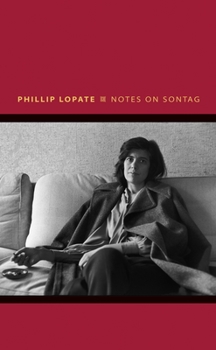Notes on Sontag
(Part of the Writers on Writers Series)
Notes on Sontag is a frank, witty, and entertaining reflection on the work, influence, and personality of one of the "foremost interpreters of . . . our recent contemporary moment." Adopting Sontag's favorite form, a set of brief essays or notes that circle around a topic from different perspectives, renowned essayist Phillip Lopate considers the achievements and limitations of his tantalizing, daunting subject through what is fundamentally...
Format:Hardcover
Language:English
ISBN:0691135703
ISBN13:9780691135700
Release Date:March 2009
Publisher:Princeton University Press
Length:256 Pages
Weight:0.74 lbs.
Dimensions:0.8" x 4.7" x 7.5"
Customer Reviews
3 ratings
Lopates take on Sontag
Published by Thriftbooks.com User , 14 years ago
Philip Lopate is a wonderful essayist with an always engaging personal style. He does a credible job at reviewing Sontag's work and personality as he experienced it and her. He also comes clean on his need for her approval and having to live with the fact that he never got it. But I think he dances around the elephant in the room which is Sontag's self-mythology that spawned a cultural equivalent about her. While much of her writing is laudable, incisive and even brillant, it will be her iconic status as both the high priestess of intellectual seriousness and that of the sexy, man-eating intellectual that will forever cast a shadow over often her impressive work. Maybe Lopate was too close to both aspects - the intellectual elite where Sontag really matters and his own personal even if tenuous relationship with the diva. For all her brilliance, Sontag is said to have been a petty, insecure, often cold and insensitive snob who was unable to transform her acute intelligence into productive self awareness and dare I say, grace as she aged. That is what made her iconic, the towering intellectual who was clueless about human beings. I believe that her soaring gracelessness is the stuff of New York intelligentsia legend. Lopate hints at this reputation and gives us just a taste of it in the book. Rather than tip-toe around the Sontagian personality, that toxic mixture of myth making, extreme vulnerability, massive ego, and extreme vitality, he should have confronted it directly along with her writing. For the truth is that Sontag will forever remain a legendary personality that will be remember long after anyone remembers the title of a single one of her books.
The Art of Balance
Published by Thriftbooks.com User , 15 years ago
There's great imaginative sympathy in this assessment of Sontag and her work, and no knife in the ribs. It's utterly unlike those remembrances of literary celebrities by contemporaries who establish their authority by boasting of intimacy with the subject and then use these occasions to tell secrets and destroy reputations. Judicious though the book is, Lopate's tone is anything but solemn. Instead, he registers his interest, approval, exasperation, amusement, disapproval, envy of Sontag, conflicted longing for friendship with her, etc., as he goes along. He writes here both as critic and as personal essayist and what he creates is a kind of double portrait. By acknowledging and examining his reactions, he frees himself from their control; that makes his stance toward his subject particularly supple, and his insights multi-angled. Through his career as a personal essayist, Lopate has valued balance. He has demonstrated the art of balance in his own personal essays and students and admirers have taken note. It hasn't been a cautious, middle-of-the-road kind of exercise, but a real struggle, at times a painful one, requiring the disclosure of much that is unbecoming. Over and over he has achieved it (would that Sontag had!). Here he has done it again, and with this little book, has -- I believe -- truly established himself as a literary senior statesman.
Much Ado About Noting
Published by Thriftbooks.com User , 15 years ago
Phillip Lopate, warm and sane as ever, labors diligently to persuade us that Sontag is a major intellect and a permanent writer. He fails, of course, but that is Sontag's fault and not his own. Lopate can be faulted for his Manhattan insularity, his dated cinephilia, his excessive loyalty to formative youth experiences (the latter accounting for both his datedness and his insularity). But these are human frailties, and Lopate is never less than attractively human, something which can hardly be said of Sonatg.






